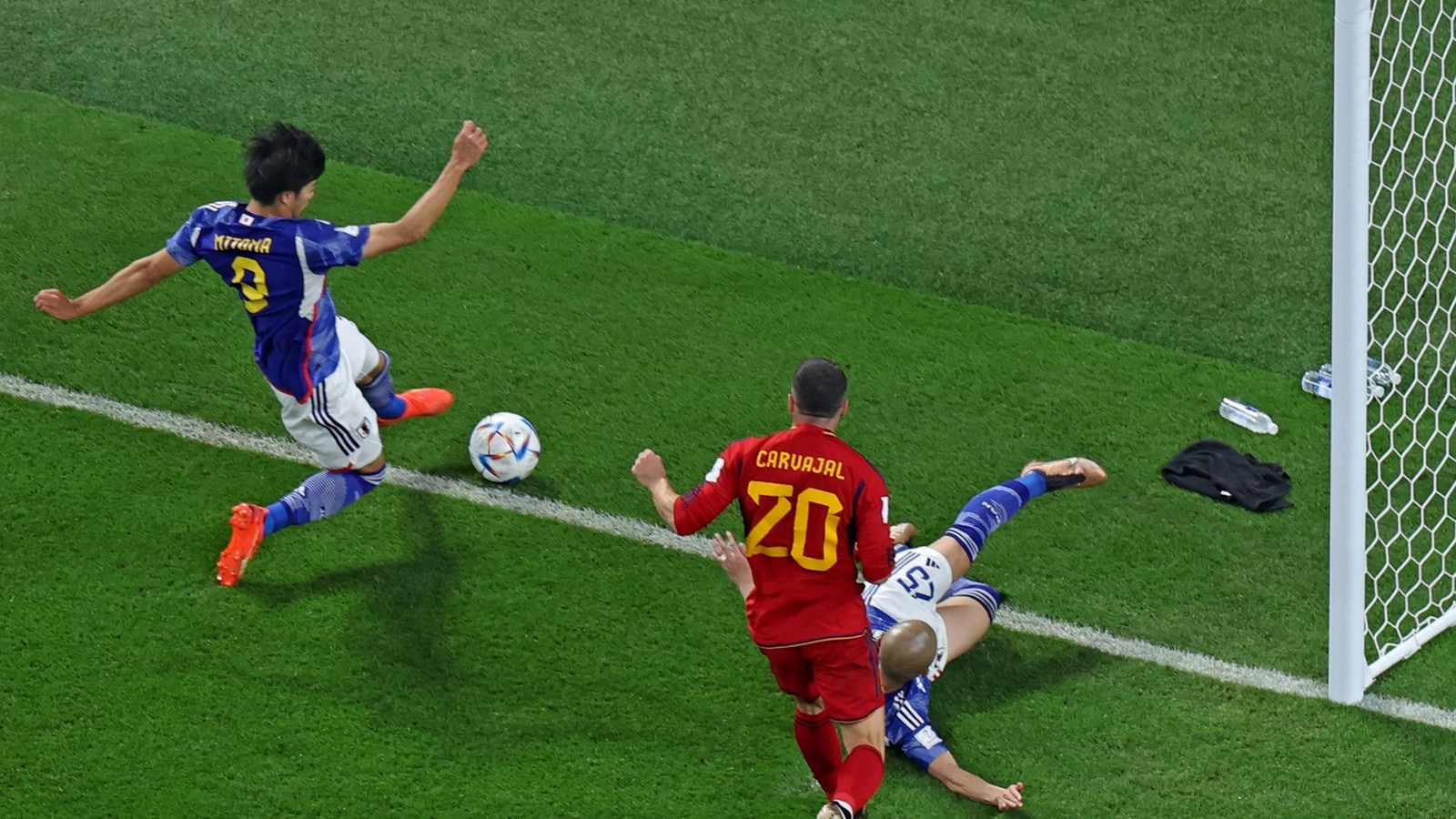Deja vu for Germany as refereeing decisions grab the spotlight
Amid the dismay after their group stage elimination, Germany, their fans and World Cup followers in general would have felt the ghosts of past World Cups had revisited the four-time champions. Only, this time it wasn’t even on their own playing patch.
Germany were eliminated in the group stage for the second straight World Cup despite beating Costa Rica 4-2 in their final Group E game on Thursday night. They finished level on four points with Spain, who went through as the second team on superior goal difference.
Japan topped the group after their 2-1 comeback win over Spain, though controversy erupted as their winning goal, according to TV footage and photographs, seemed to cross the byline before Kaoru Mitoma cut back for Ao Tanako to tap in. The goal was initially ruled out by the assistant referee, but prolonged VAR checks decided the ball had not entirely crossed the line.
A BBC Sport report explained the “not fully crossed the line” aspect as “…if you drew an imaginary line upwards at 90 degrees from the far edge of the whitewash (white line), it would have still passed through the curve of the ball — albeit only just — even though the part of the ball that touched the ground had fully crossed the line.”
Japan topped the group with six points. Spain qualified only because Germany did not lose to Costa Rica. After the match, Spain coach Luis Enrique was livid. “I have seen a photo that must have been tampered with, it cannot be that this photo is real. It has to be manipulated,” he said.
As Germany face the heat over their performances, they would have felt a sense of deja vu. Germans are unconvinced, 56 years on, that Geoff Hurst’s extra-time goal that gave England victory over West Germany in the 1966 World Cup final defeat crossed the goal line. At Wembley, the ball bounced off the underside of the bar and was cleared. The Swiss referee Gottfried Dienst consulted the linesman Tofiq Bahramov of Azerbaijan before awarding the goal.
Technology, amazingly, has wiped out one major source of controversy—off-side goals. With VAR and modern imaging techniques dissecting even minute infringements, teams have had no reason to complain. It is also why the phase of play is not immediately stopped when the assistant referee decides a player is off-side. One example was the chalking off of Vinicius Jr’s attempt in the 1-0 win over Switzerland.
Technology though hasn’t wiped out controversies at the Qatar World Cup.
The first came over the referee waving off penalty claims after England’s Harry Maguire’s tackle by Iran’s Rouzbeh Cheshmi following a corner early in the game. A similar infringement by John Stones though was penalised after VAR intervention, allowing Iran to score a consolation goal in the 2-6 defeat.
The penalty award for Mohammed Salisu’s minimal contact with Cristiano Ronaldo in Portugal’s 3-2 win over Ghana in Group H triggered an uproar. The contention was that, despite a VAR check backing the penalty, the Portugal star’s standing in the game had influenced the decision. The match was goalless at that point and Ronaldo converting the attempt helped Portugal take control.
A FIFA technical study group didn’t really help matters. It analysed the penalty award and called Ronaldo “a total genius” for exploiting the penalty rule after going to ground on minimum contact.
There was more bafflement when Messi’s claim he was fouled by Poland goalkeeper Wojciech Szczesny led to a penalty. A VAR check was followed by Dutch referee Danny Makkelie being asked to have a second look and he pointed to the spot. This was despite clear evidence that Messi had already headed the ball away when Szczesny’s palm made contact with his head.
The debate was more muted than in Ronaldo’s case because Szczesny saved the penalty, and Argentina won 2-0 and topped Group C. Former England defender Rio Ferdinand, as TV pundit, called the penalty “disgraceful” and social media said justice was done with Messi’s miss.
Szczesny later revealed he had even bet 100 euros with Messi that the penalty would not be awarded.
Two incidents of handling too led to criticism.
Portugal, in their 2-0 win over Uruguay, were awarded a penalty after the ball brushed Uruguay defender Jose Gimenez’s hand as he tried to break his fall. The referee’s decision was confirmed by VAR. Bruno Fernandes converted for his second goal but pundits and fans slammed the decision.
The International Football Association Board (IFAB), which governs the laws of football, says handball should be awarded for deliberate movements towards the ball or when “a player is considered to have made their body unnaturally bigger when the position of their hand/arm is not a consequence of, or justifiable by, the player’s body movement for that specific situation”.
Ghana though would consider themselves lucky in their 3-2 defeat of South Korea after Salisu’s goal was allowed to stand despite it having bounced off captain Andre Ayew’s arm during a goalmouth melee. A VAR check allowed it to stand. IFAB rule states that accidental handball leading to a teammate scoring will be allowed though a goal scored immediately by a player after the ball had touched the hand won’t be.
For all the latest Sports News Click Here
For the latest news and updates, follow us on Google News.


